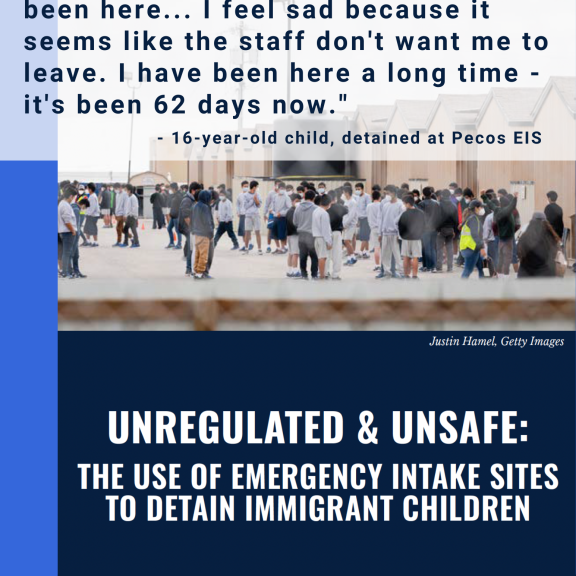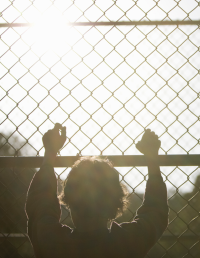NEVER AGAIN: Emergency Intake Sites (EISs) Harm Immigrant Children
National Center for Youth Law released a groundbreaking report that details the devastating and harmful experiences of children — in their own words — whom the government detained, some of them for months, in EISs.
The report offers an unprecedented look into the government’s unlicensed Emergency Intake Sites (EISs) and the experiences of the thousands of immigrant children who were detained within them. NCYL attorneys had access to interview children at these unlicensed facilities as Flores co-counsel.
Background
In March 2021, the Office of Refugee Resettlement (ORR) began placing thousands of unaccompanied children–immigrant children who entered the United States without their parents or legal guardians–in new Emergency Intake Sites (EISs). These makeshift facilities were opened in large convention halls, military bases, oil worker “man camps,” and other sites.
EISs were designed as a short-term emergency response to mitigate dangerous overcrowding within U.S. Customs & Border Protection (CBP) facilities. Despite this intention, the government detained thousands of children in EISs for over a month, with some children detained in EISs for approximately three months.
ORR’s use of EISs was unprecedented and placed children’s safety and welfare at risk. Unlike ordinary ORR shelters, EISs did not have a state license to care for children and lacked mandatory child welfare standards and independent oversight. EISs represented a step backward even from unlicensed Influx Care Facilities previously used by ORR.
Center Youth
NCYL attorneys visited 12 EISs and interviewed more than 170 children detained at EISs as part of our work monitoring compliance with the Flores Settlement Agreement. During these interviews, children frequently reported confusion and distress related to their prolonged detention, limited access to recreation and education, and most concerning, deteriorating mental health and a sense of hopelessness.
These interviews informed our report, which makes several recommendations about how the government can ensure that our country never again detains children in these types of facilities.
The report calls on the government to:
- Commit to never again opening any type of facility that falls below the standards of Influx Care Facilities.
- Decrease reliance on Influx Care Facilities.
- Increase ORR’s use of state-licensed beds, specifically beds in family like settings.
- Expedite the safe release of children from ORR custody.
- Promptly place children without sponsors into Long Term Foster Care (LTFC) or the Unaccompanied Refugee Minors (URM) Program.






